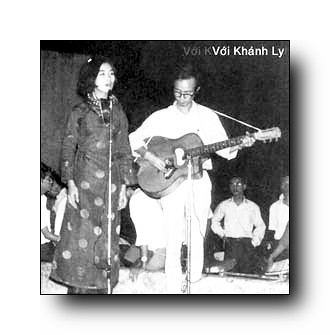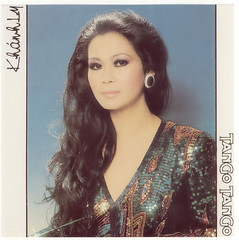VIETNAM
We want to be your friend
Apr 24th 2008
From The Economist print edition
And yours, and yours, and yours too: foreign policy made simple
HAVING won what they called the “American war”, chased off a brief Chinese incursion and reunited the country, Vietnam's Communist leaders chose a diplomatic policy that turned out to be a disaster: cosying up to Moscow. As the party's general secretary told the 1982 congress, “the unity and comprehensive co-operation with the Soviet Union are always the cornerstone of the foreign policy of our party and country.” Even before Soviet communism's collapse, a near-starving Vietnam had begun switching from collectivisation to a market economy—and rethinking its foreign policy. By the 1986 party congress, a new policy, “to be friends with all people”, was under discussion.
EPA And how was reunification for you, Mrs Merkel?
And how was reunification for you, Mrs Merkel? That line has been followed with increasing conviction ever since, as Vietnam has emerged from isolation to become a significant presence on the diplomatic stage. In 1993 an American-led boycott on aid was eased. Two years later relations between the governments in Washington, DC, and Hanoi were restored and Vietnam joined the Association of South-East Asian Nations (ASEAN).
Since then the country's diplomacy, like its economy, has come on in leaps and bounds. In 2006 it won admission to the World Trade Organisation and hosted Presidents George Bush, Vladimir Putin and Hu Jintao, among other world leaders, at the Asia-Pacific (APEC) summit in Hanoi. A senior Western diplomat says Vietnam had a wobbly start to its year of chairing APEC but, as people often say about the Vietnamese, they learned extremely quickly and by the time of the summit they had become a supremely smooth diplomatic team. This year Vietnam won a temporary seat on the United Nations Security Council, causing its views to be more assiduously courted than perhaps at any time in the country's history.
Vietnam's soaring trade and large population are making it an increasingly important commercial partner. Hardly a week passes without a foreign leader visiting Hanoi. Vietnamese leaders, for their part, find themselves welcomed in the world's capitals. In March the prime minister, Nguyen Tan Dung, toured Europe, getting warm receptions from his German, British and Irish counterparts.
Vietnam has carefully rebuilt relations with both America and China. It is probably more enthusiastic about its friendship with America, which has more to offer it in terms of foreign investment and expertise. In November two American warships became the first to visit northern Vietnam in peacetime. Even before the restoration of relations Vietnam was co-operating with America in searching for the remains of soldiers missing in action.
There is still friction over paying compensation to the many Vietnamese said to be suffering the ill-effects of Agent Orange, a defoliant that America and its allies used in the Vietnam war. In February Vietnam criticised the rejection by an American federal appeals court of a case that Vietnamese sufferers brought against the chemical's makers. But Vietnam's leaders are not allowing such disputes to hold up progress in other areas.
Vietnam has also learned to tread carefully in its relations with China, a serial invader and dominator down the centuries. Again, it does not want to let old enmities get in the way of doing business. But there is still a dispute over who owns the Spratlys and the Paracels (to the Vietnamese, the Truong Sa and the Hoang Sa), two potentially hydrocarbon-rich archipelagoes in the South China Sea which other nearby countries also claim. In 1988 China and Vietnam fought a brief naval battle off the Spratlys. Last December Vietnamese students held “spontaneous” anti-Chinese protests in Hanoi, after reports that China was creating a new municipality incorporating the islands.
Even so, the exchanges between Hanoi and Beijing have remained restrained and the two are trying to finish the long-delayed job of demarcating their land borders by the end of this year. Despite heavy investment by Taiwanese firms in Vietnam, the Hanoi government continues to appease the government in Beijing by firmly supporting a “one China” policy. With their own country having so recently been reunited, the Vietnamese feel obliged to support a close neighbour that harbours similar ambitions.
Finding its voice
Fellow ASEAN members, on whose territory Vietnam had encroached during its centuries-long southwards expansion from the Red River delta, long saw it as an expansionist “Prussia of Indochina”, but these days relations are relatively smooth. Vietnam's main interest in ASEAN is pushing the block to hurry up and become a proper single market. Vietnamese firms are investing in Cambodia and Laos, with which relations have greatly improved, but Cambodia's opposition remains virulently anti-Vietnamese.
Vietnam's bosses recently bade a fond farewell to Fidel Castro, their fellow revolutionary, when he resigned as Cuba's leader, but the days when Vietnam clung to the diminishing band of communist countries are long gone. “It's amazing how they really do convince you that they are your best friend,” says a Western diplomat in Hanoi. It used to be hard to get the Vietnamese government to comment on anything of more than parochial concern, but now it has become an enthusiastic issuer of statements on world affairs, especially since joining the Security Council.
Vietnam has tried to keep to a multilateralist line, for instance urging compliance with UN resolutions in various African conflicts, but it is now discovering that in diplomacy it is not possible both to be important and to stay friends with everyone. Sitting on the Security Council involves making controversial choices. In February Vietnam came down against recognising Kosovo's independence, disappointing Western powers which had tried to persuade it that the Balkans were a special case and recognition would not set a precedent for separatism elsewhere.
Shortly afterwards the vote on sanctions against Iran over its nuclear programme set another test for Vietnam's diplomacy. The Vietnamese insisted on changing the wording, but they then joined Russia, China, America, Britain and France in supporting the resolution, whereas Indonesia, a fellow ASEAN member that also currently holds a Security Council seat, abstained.
Vietnam's overriding interest in its foreign relations has been to accelerate its economic development. The main point of having “friends everywhere” is to seek their investment and their technical help. Another goal is seeking and maintaining trade access for Vietnamese farm produce and manufactures. Vo Tri Thanh, a trade economist in Hanoi, argues that Vietnam could play a positive role in the Doha round of world trade talks as a fairly poor country that nevertheless strongly supports freer trade. In the absence of progress on the Doha round, Vietnam is seeking bilateral and regional trade deals. It has started talking to Japan about a free-trade agreement, and diplomats say there is a chance that the limited trade-liberalisation pacts struck with America could develop into a full-blown free-trade deal.
Some ASEAN members, such as the Philippines, would like the block to develop a stronger security aspect. The Filipino military commander, General Hermogenes Esperon, recently called on neighbouring countries to join his country's annual war games with America. But Vietnam is likely to remain wary about such things. Its leaders still remember being vilified over their intervention in Cambodia in the 1970s, even though it brought down the ghastly Pol Pot regime. Still, with a big well-disciplined army and no domestic conflicts, Vietnam would make a good provider of UN blue helmets. In March its ambassador to the UN announced that Vietnam was preparing for some involvement in peacekeeping missions.
Vietnam could play a broader role in some of the world's destitute and conflict-ridden zones. Having emerged from war and penury to become peaceful, stable and increasingly prosperous, Vietnam sets an example for others. Because it is clearly not in the pocket of a former colonial power, it is more likely to be listened to. It is already chairing the Security Council's committee on Sierra Leone and is helping the country with its agriculture.
Vietnam is also edging towards becoming an important intermediary between North Korea (with which it has unusually good relations) and the outside world. In October the Communist Party's Mr Manh got the red-carpet treatment from North Korea's Kim Jong Il on a visit to Pyongyang. America is gently encouraging Vietnam to offer the North Koreans advice on reforming their economy.
Vietnam's leaders, along with its youthful and optimistic population, genuinely seem to have overcome any bitterness about past conflicts and are looking firmly to the future. If the country can show other starving and war-ravaged nations how to escape from their predicament, its seat at the diplomatic top table will be richly deserved.

 In unhappier days
In unhappier days









 - Bà Tôn Nữ Thị Ninh, nguyên Phó chủ nhiệm Ủy ban đối ngoại của Quốc hội, có ý kiến quanh sự kiện bầu chọn và việc vịnh Hạ Long bị tạm loại khỏi danh sách 7 kỳ quan mới của thế giới.
- Bà Tôn Nữ Thị Ninh, nguyên Phó chủ nhiệm Ủy ban đối ngoại của Quốc hội, có ý kiến quanh sự kiện bầu chọn và việc vịnh Hạ Long bị tạm loại khỏi danh sách 7 kỳ quan mới của thế giới.
